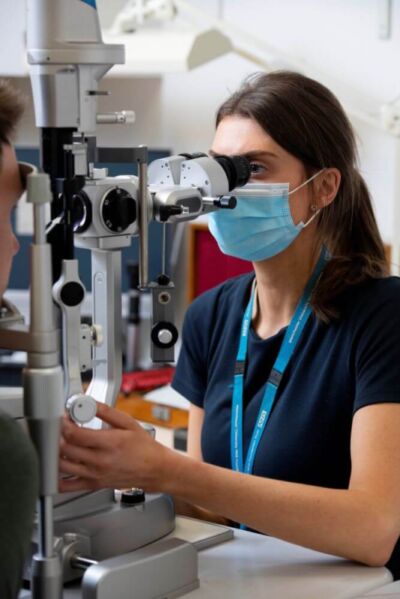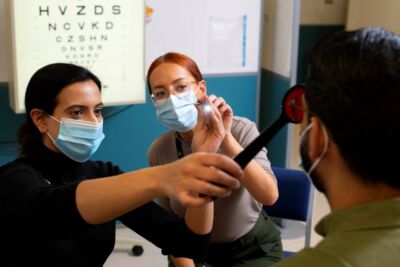Work shadow an orthoptist
University places for Orthoptics are competitive. At your interview you should have a good understanding of what orthoptics is and are advised to observe an Orthoptist in practice before applying for a place. This will show your interest in, and commitment to, the profession.
Experience of working in a caring or healthcare environment, either in a paid or voluntary capacity, is useful. Work with children, people with special needs and the elderly is particularly relevant.
However, the best way to get a realistic picture of what the job entails is to observe an Orthoptist performing their daily work routine. Work shadowing will allow you to make an informed decision that orthoptics is the career you expect it to be before applying for the university course.
What to expect from your visit
Work shadowing isn’t intended to teach you about orthoptics itself, but it will give you an insight of what an Orthoptist does, how their work impacts on patients and the kinds of decisions they have to make.
After making an application for a work shadow placement, you will be invited along to a local orthoptic department where you will shadow an Orthoptist and everything they do that day as part of their job.
You may only have a short amount of time to shadow an Orthoptist during clinic, at busier times this may mean that the discussion time you have with a clinician may be limited. That’s why it is so important to come prepared!

Prepare for your visit
There are a number of things you can do to make sure you are fully prepared for your visit and get the most out of it.
1. Do prior research
While you are not expected to know everything about orthoptics, the more you can find out before, the more you will get from the visit. You don’t want to spend your limited time with an Orthoptist asking questions you could have found out before!
A good start is the BIOS website:
2. Prepare questions in advance
Think about what matters to you most about choosing a career and some of the things you will not be able to find out from your research. There may be something that particularly stands out from what you have already read, that you would like to discuss further.
Questions you may want to ask…
- Why did you choose orthoptics?
- How easy was it for you to find a job after qualification?
- How do you manage your work-life balance?
Don’t just talk to orthoptists. Speak to patients and other staff groups who work closely with the orthoptists to get a wider idea of who they work with and how. Always remember to explain who you are and what you are doing.
3. Write down what you learn
You will find out a huge amount on your visit make sure you write some of it down!
To get the most out of your work shadow experience it is advised that you keep a reflective diary of what you have learned, what you liked and disliked and anything that made a particular impression on you. This will be a useful reminder when it comes to applying for university and it also shows admission tutors that you have a good understanding of what an orthoptist does.

When making notes and discussing experiences, remember that it is essential to protect patient confidentiality.
You will also be asked to fill out a feedback form for your placement, this is important for us to ensure prospective students are getting the right support to help them apply for an undergraduate course in orthoptics.
If you were not given the opportunity to give feedback, then you can do this here.
Arranging a visit
If you’re interested in seeing the work that an orthoptist does in person, we have a long list of orthoptic departments keen to show off what a great profession this can be. Drop us an email and we’ll look to arrange a visit near to you.
To get help with finding a work shadow experience in your area, fill in our short form here.